

Editorial and Mammoths: Animal Revivals and Ethics. Jul 14, 2015 05:36 PM EDT The most popular motion picture in theaters now is Jurassic World, a sequel to the 1993 science-fiction feature.
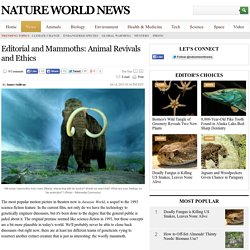
In the current film, not only do we have the technology to genetically engineer dinosaurs, but it's been done to the degree that the general public is jaded about it. The original premise seemed like science-fiction in 1993, but those concepts are a bit more plausible in today's world. Simon Cowell to CLONE his beloved pet pooches Squiddly and Diddly at a cost of £120,000.
Simon Cowell plans to clone his beloved Yorkshire Terriers Squiddly and Diddly using a biotech firm in South Korea.

The X Factor judge has asked aides to research Sooam Biotech, the company which last year created Britain’s first cloned dog, from a 12-year-old dachshund called Winnie. The procedure costs around £60,000 a dog, but a source said: “Money is not an issue. Simon is determined to make it happen. “He has briefed aides and they are looking to see whether Sooam is a viable option.” A pal said that Cowell was so attached to his dogs, who are both aged two, he could not bear to think of life without them. Getty The source added: “Sooam seems to be the only plausible company at the moment and Simon is expecting a report back soon from his aides confirming whether it’s a goer. “Clearly, Simon wants to make sure that any cloning procedure is above board and safe for the dog. Their music mogul owner gives his millions of Twitter followers regular updates on their antics. New Zealand abandons cloning farm animals after 90 PER CENT died during trials. By Sean Poulter for the Daily Mail Updated: 09:36 GMT, 24 February 2011 Scientists in New Zealand have abandoned trials on producing cloned farm animals after a large number of deaths and evidence of suffering.
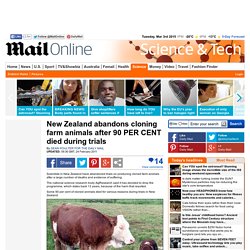
The national science research body AgResearch said it has decided to drop the programme, which dates back 13 years, because of the harm that resulted. Some 90 per cent of cloned animals died for various reasons during trials in New Zealand. Duplicates: The first successful clone of a cloned animal makes its debut in Brazil in 2004. New Zealand has abandoned trials on producing cloned farm animals after a large number of deaths and evidence of suffering The main problems were spontaneous abortions and hydrops - where a cow's uterus filled up with water, leading to the mother being put down as well.
Reports issued under the Official Information Act also detailed chronic arthritis, pneumonia, lameness and blood poisoning among the causes of cattle, sheep and goat deaths. Woolly Mammoth. Wooly mammoth: it could be cloned.
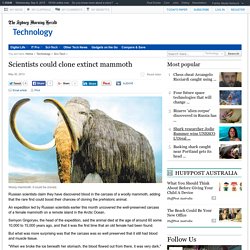
Russian scientists claim they have discovered blood in the carcass of a woolly mammoth, adding that the rare find could boost their chances of cloning the prehistoric animal. An expedition led by Russian scientists earlier this month uncovered the well-preserved carcass of a female mammoth on a remote island in the Arctic Ocean. Semyon Grigoryev, the head of the expedition, said the animal died at the age of around 60 some 10,000 to 15,000 years ago, and that it was the first time that an old female had been found. But what was more surprising was that the carcass was so well preserved that it still had blood and muscle tissue. "When we broke the ice beneath her stomach, the blood flowed out from there, it was very dark," Grigoryev, who is a scientist at the Yakutsk-based Northeastern Federal University, told AFP. Jeju cow. A biotechnological technique to chill an egg to -196℃ quickly and then defrost it later at a desired time has been commercialized in Korea for the first time.
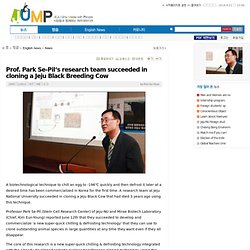
A research team at Jeju National University succeeded in cloning a Jeju Black Cow that had died 3 years ago using this technique. Professor Park Se-Pil (Stem Cell Research Center) of Jeju-NU and Mirae Biotech Laboratory (Chief, Kim Eun-Young) reported June 12th that they succeeded to develop and commercialize ‘a new super-quick chilling & defrosting technology’ that they can use to clone outstanding animal species in large quantities at any time they want even if they all disappear. Animal death toll ends cloning trials - national. Last updated 05:00 21/02/2011 STOPPED: AgResearch has ended its cloning trials after acceptable death rates were recorded.
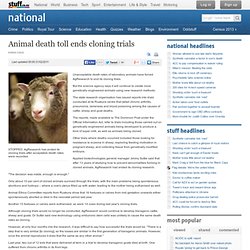
Unacceptable death rates of laboratory animals have forced AgResearch to end its cloning trials. But the science agency says it will continue to create more genetically engineered animals using new research methods. The state research organisation has issued reports into trials conducted at its Ruakura centre that detail chronic arthritis, pneumonia, lameness and blood poisoning among the causes of cattle, sheep and goat deaths. The reports, made available to The Dominion Post under the Official Information Act, refer to trials including those carried out on genetically engineered animals being developed to produce a kind of super milk, as well as animals being cloned. Other trials where deaths occurred included those looking for resistance to eczema in sheep, exploring feeding motivation in pregnant sheep, and collecting tissue from genetically modified embryos.